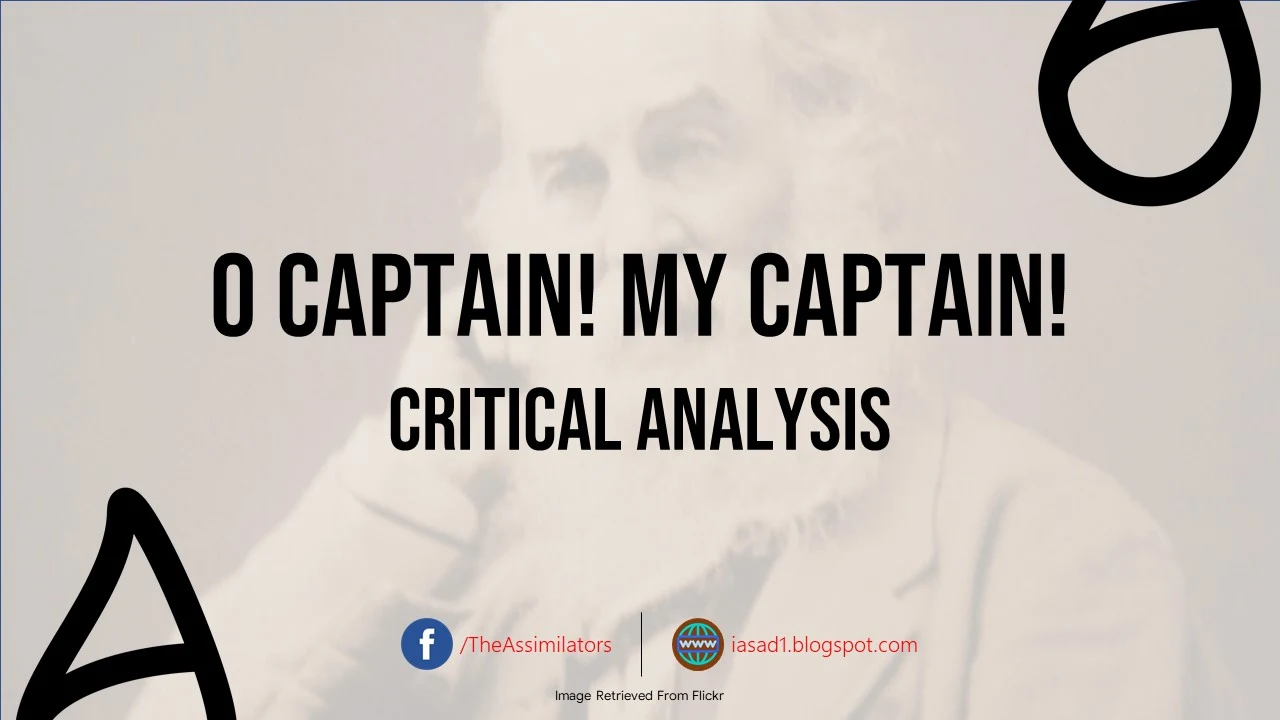Background Information
O Captain! My Captain! is an elegy (a funeral poem) on the death of Abraham Lincoln, written by Walter Whitman. This poem, along with other 17 poems, featured the aftermath of American Civil-War, a four-year war between the northern and southern states on the issue of slavery and independence from the union. This poem appeared at first in 1865 in a pamphlet called Sequel to Drum-Taps. This poem is written as an extended metaphor to pay tribute to Abraham Lincoln who "anchored the ship safe and sound". Walter Whitman was a great admirer of the president and called him "My father".
Situation
The poem opens on the speaker's indication of the safe arrival of the ship. But the "bleeding drops of red" indicate to the death of the ship's captain. The speaker calls up the dead captain to "rise up and hear the bells". Then the speaker mourns the inanimate state of his captain.
My Captain does not answer, his lips are pale and still,
My father does not feel my arm, he has no pulse nor will,
Development of Themes
The first theme that is developed in the beginning of this poem is the theme of victory and loss. On one hand, their "fearful trip is done". They have stood victorious in the battlefield of the American Civil War. But on the other hand, they have lost their "father" who enjoined them as one nation. The celebration of the triumph and mourning the death of Abraham Lincoln go hand in hand in this poem.
The theme of grief and isolation is an integral part of the poem in which the poet describes the collective grief of the general public who is "swayingly" welcoming the captain on the seashore. The collective grief is interlinked with the poet's personal grief as his father.
You’ve fallen cold and dead.
This assassination interlinks an individual to a massive political community and they, as one nation, continue to thrive even after the departure of their political father.
Figurative Language
The whole poem is an extended metaphor and is numbered in three. The first extended metaphor appears as a ship's "Captain" who is the president of the US Abraham Lincoln. The second extended metaphor, "the voyage" is used as a timeline for the American Civil War. The third metaphor is "the ship" which stands for the United States itself. While "reck" is used as a symbol for the war itself.
Whitman also implies personification when he addresses the "shores" to blow the trumpet of victory. The poet also uses apostrophe to call upon the dead captain "O Captain! My Captain!" to show his love and devotion for his political father.
Setting and Imagery
The poem mostly takes place on a ship and a sea-shore. Apparently, it is hard to determine the time and place but a careful reading of this poem fixes the issue. The ship might be located somewhere in northern America in the 1860s. The poem boasts concrete visual imagery like "lips and pale and still", "bleeding drops of red", "cold and dead" and "weather’d every rack" which provide enough scenery to empower the imaginative projector to visually present the story in a reader's eyes.
Structural Analysis
This poem is composed of three stanzas of eight lines. Each stanza is made of double quatrains. The whole poem is written in heroic couplet except for the last couplet in every stanza. So, the poem follows a rhyme scheme of AABBCDED. This poem does not follow a patterned meter. In poetic terms, it is a Scansion. However, the rhythm in this poem is mostly iambic. "Fallen cold and dead" is repeated thrice in this poem to form a refrain and repetition. This poem also houses the phrases in which the sound of vowels and consonants is observed. The /f/ and /g/ sound in "flag is flung" is alliteration and consonance respectively. While the likeness of vowel sounds of /i/ in 'ship' and 'trip' is assonance.
Conclusion
This elegy is a beautiful structured and themed poem to pay tribute to one of the most eminent personalities in the world of politics in three extended metaphors.



beautifully analysed.
ReplyDeletei wanna get your blog theme can you give me?
ReplyDeleteyes, I'll gift you for free.
DeleteThis comment has been removed by a blog administrator.
ReplyDelete